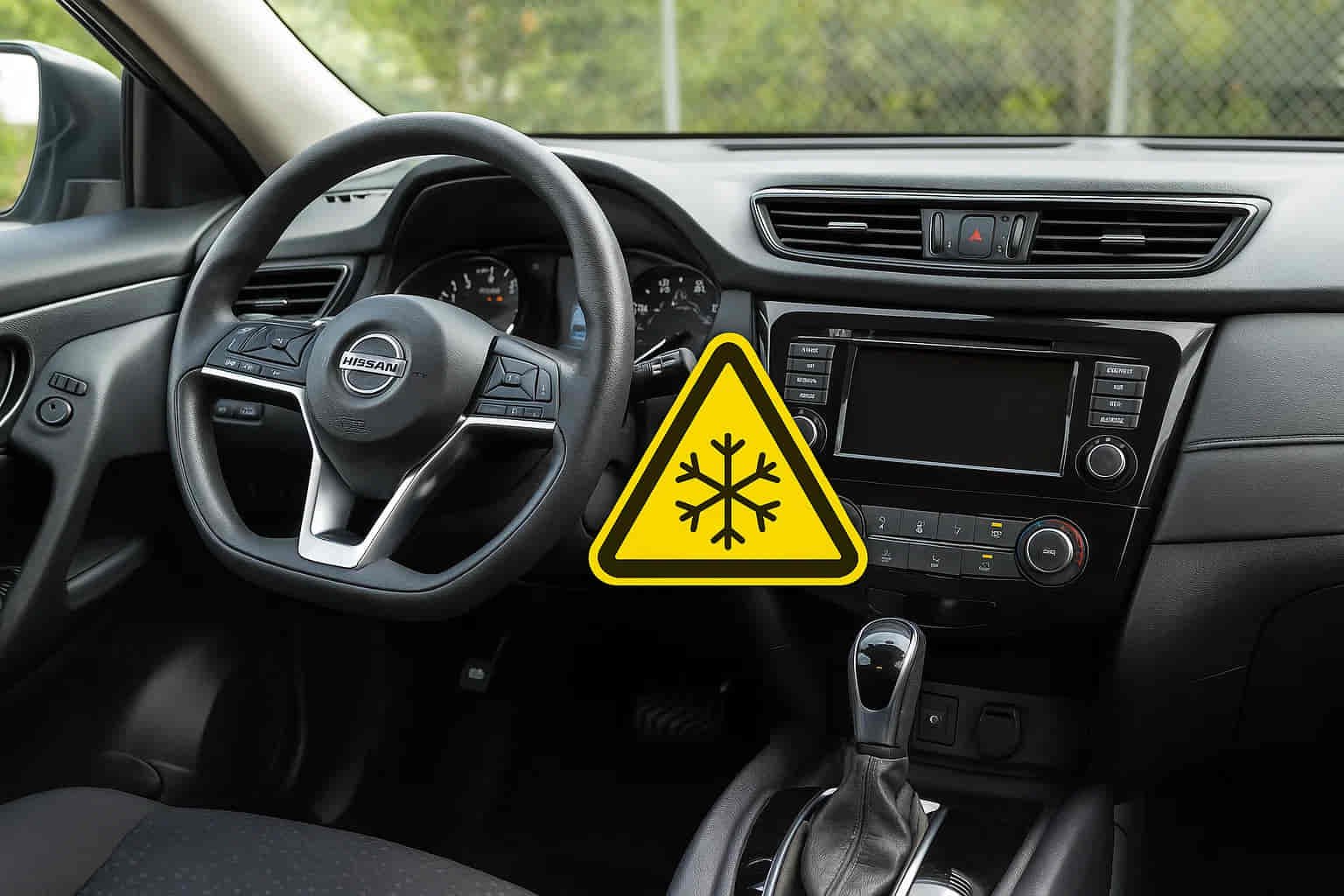When the summer heat rises and your Nissan Rogue’s air conditioner suddenly stops working, the frustration can be overwhelming. Comfort inside the cabin is one of the main reasons drivers rely on the Rogue, but when the AC begins to blow warm air or fails to respond altogether, it quickly becomes more than just a minor inconvenience. For many owners, the first thought is often the cost of repair, but in reality, the problem may be linked to a few common issues that can often be identified without advanced mechanical knowledge.
The air conditioning system in the Nissan Rogue is built from several interconnected components such as the compressor, refrigerant lines, blower motor, and electronic controls. When one of these parts malfunctions, the system can no longer maintain cool airflow. Understanding these underlying causes is crucial because some can be solved with simple maintenance, while others may require professional attention.
In this guide, we will walk through the seven most frequent reasons why a Nissan Rogue air conditioner is not working and provide practical fixes you can consider before heading to the repair shop. By the end, you’ll know whether the issue is minor enough to handle yourself or if it is time to trust a certified mechanic.
Low Refrigerant
One of the most common reasons a Nissan Rogue air conditioner stops working is low refrigerant. The refrigerant is the substance that absorbs heat from inside the cabin and releases it outside, keeping the airflow cool. If the system is short on refrigerant, the AC may blow warm air, cycle on and off irregularly, or fail to cool the car altogether.
In most cases, refrigerant levels drop because of a leak in the system. Small cracks in the condenser, worn-out seals, or damaged hoses can allow the gas to escape over time. Drivers may notice hissing sounds when the AC is running or see oily residue around AC components—both are signs of leakage.
The fix depends on the severity of the issue. If the refrigerant is simply low, a recharge using the correct type—typically R-134a for older Rogue models or R-1234yf for newer ones—may restore cooling performance. However, recharging without repairing the underlying leak will only provide temporary relief. A proper inspection by a certified technician can help identify the leak’s location and prevent repeated failures.
Faulty AC Compressor
The compressor is often called the heart of the Nissan Rogue’s air conditioning system because it circulates refrigerant through the network of hoses and coils. When the compressor fails, the entire cooling process breaks down, leaving the cabin with nothing but warm air.
A failing compressor usually shows clear warning signs. Many owners notice a lack of the familiar “click” sound when the AC is switched on, which indicates the clutch is not engaging. In other cases, the compressor may seize up completely, causing unusual noises under the hood or even triggering dashboard warning lights.
The causes range from natural wear and tear to internal damage caused by contaminated refrigerant or lack of lubrication. Unfortunately, unlike a clogged filter or low refrigerant, a faulty compressor cannot be resolved with simple DIY fixes. Replacement is often the only solution, and the repair cost can range between $700 and $1,000 depending on labor rates and parts availability.
While the expense may seem high, a properly functioning compressor is essential for consistent cooling. Ignoring this issue can put additional strain on other AC components, making future repairs even more costly.
Clogged Cabin Air Filter
Another frequent reason the Nissan Rogue air conditioner stops working effectively is a clogged cabin air filter. This filter is designed to trap dust, pollen, and other airborne particles before they enter the vehicle’s interior. Over time, however, it can become saturated with debris, restricting airflow and making the AC feel weak or ineffective.
Drivers often notice reduced airflow through the vents, a persistent musty odor inside the cabin, or an unusual whistling noise when the AC is running. While the system may technically still function, the cooling efficiency drops significantly, creating the impression that the air conditioner itself has failed.
The solution is straightforward and inexpensive compared to other AC issues. Nissan generally recommends replacing the cabin air filter every 12,000 to 15,000 miles, though drivers in dusty or urban environments may need more frequent changes. Replacing the filter can often restore airflow immediately, improve cooling performance, and even reduce strain on the blower motor.
By addressing this small but critical maintenance step, Rogue owners can avoid unnecessary trips to the repair shop and ensure that the air conditioning system continues to operate at peak efficiency.
Electrical Issues (Fuses or Relays)
Sometimes the reason a Nissan Rogue air conditioner is not working has little to do with mechanical parts or refrigerant levels. Instead, the issue can be traced back to the electrical system, specifically blown fuses or faulty relays. These small but vital components regulate the flow of power to the AC system, and when they fail, the entire unit can stop functioning.
Drivers may notice that the AC does not respond at all when turned on, even though other electrical systems like lights and the radio continue to work. In some cases, the blower fan may run but no cool air is produced, signaling that power is not reaching key components such as the compressor.
The good news is that electrical issues are often among the easiest and cheapest problems to resolve. Checking the fuse box for a blown AC fuse or swapping out a damaged relay can quickly restore functionality. However, recurring electrical failures may point to deeper wiring issues or a failing control module, which should be inspected by a qualified technician.
By ruling out these simple electrical causes early, Rogue owners can save time and avoid unnecessary expenses on more complex AC repairs.
Evaporator or Condenser Problems
The air conditioning system in a Nissan Rogue relies on both the evaporator and condenser to regulate temperature and humidity inside the cabin. When either of these components fails, the AC system struggles to cool properly, often leaving drivers with weak airflow or unpleasant odors.
The evaporator, located inside the cabin, is responsible for absorbing heat. If it becomes clogged with debris or develops mold, it can emit a musty smell and reduce cooling efficiency. The condenser, on the other hand, is mounted at the front of the vehicle and expels heat absorbed from the cabin. Because of its position, it is especially vulnerable to road debris, corrosion, or impact damage, all of which can cause leaks or block airflow.
Symptoms of a failing evaporator or condenser include reduced cooling, strange hissing sounds, or visible refrigerant leaks under the car. In severe cases, the system may stop producing cold air entirely. Repair solutions vary: light blockages can sometimes be cleared with cleaning, but cracks or corrosion often require full replacement.
While repairs to the evaporator or condenser can be costly, addressing the problem promptly prevents further damage to the AC compressor and refrigerant lines, ultimately saving money in the long run.
Blower Motor Malfunction
If the air conditioner in a Nissan Rogue is running but no air is moving through the vents, the problem may lie with the blower motor. This component is responsible for pushing cooled air into the cabin, and when it fails, even a perfectly functioning AC system cannot deliver comfort to the driver and passengers.
Typical signs of a failing blower motor include little to no airflow, airflow that only works at certain speeds, or strange rattling noises when the fan is turned on. In some cases, the blower motor resistor—the part that controls fan speed—may be the culprit, causing the fan to work intermittently or only on the highest setting.
The reasons behind blower motor failure vary. Dust and debris buildup can strain the motor over time, while electrical faults or simple wear and tear can cause it to burn out completely. Replacing the blower motor is often the only solution, with costs typically ranging from $300 to $500 depending on labor and parts availability.
Although it is not the most expensive AC repair, a malfunctioning blower motor can make the car nearly unbearable to drive in hot weather. Addressing the issue quickly ensures the Rogue’s air conditioning system operates smoothly and keeps the cabin comfortable.
Climate Control Module Failure
While many air conditioning issues in the Nissan Rogue are mechanical, some originate from the vehicle’s electronic brain: the climate control module. This system manages temperature settings, fan speed, and airflow direction. When it malfunctions, the AC may fail to respond to adjustments, blow inconsistent air, or shut down entirely.
Symptoms of a failing climate control module include buttons or knobs that do not register input, the display panel flickering or going blank, and temperature settings that seem stuck regardless of adjustment. In some cases, the AC may start blowing hot air even when set to maximum cool.
The causes can be as simple as a software glitch or as complex as internal circuit damage. Sometimes, a hard reset of the system—disconnecting the car battery for a short period—can restore normal function. However, persistent failures often require module replacement, which can cost several hundred dollars depending on the Rogue’s model year.
Though less common than refrigerant leaks or compressor issues, climate control module failures are particularly frustrating because they affect the driver’s ability to command the entire AC system. Quick diagnosis and repair are key to preventing extended discomfort during hot weather.
Conclusion
A Nissan Rogue air conditioner not working can turn even the shortest drive into an uncomfortable experience, but the underlying causes are often easier to identify than many drivers expect. From low refrigerant and clogged filters to compressor or blower motor failure, each problem leaves behind specific warning signs that point toward the solution. Some fixes—like replacing the cabin air filter or checking a blown fuse—can be handled at home with minimal cost. Others, such as a failed compressor or climate control module, require professional attention and a greater investment.
The key is not to ignore the symptoms. Continuing to drive with a weak or non-functional AC system can lead to bigger problems, including additional strain on other components and higher repair bills down the road. By recognizing the seven most common causes of AC failure in the Nissan Rogue, owners can make informed decisions about whether a quick DIY solution will suffice or if it’s time to schedule service with a certified mechanic.
Don’t let a broken AC steal the joy from your driving experience. If your Nissan Rogue air conditioner is not working, start with these checks, take action quickly, and enjoy the peace of mind that comes with a cool and comfortable ride.

